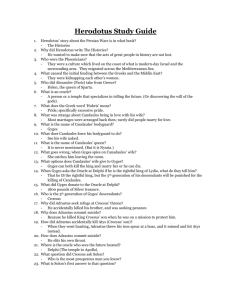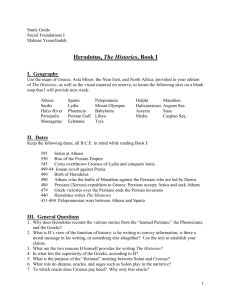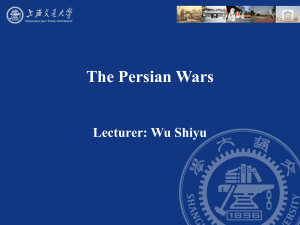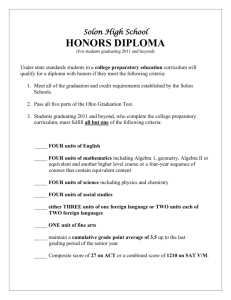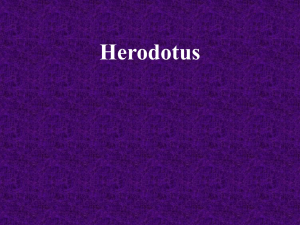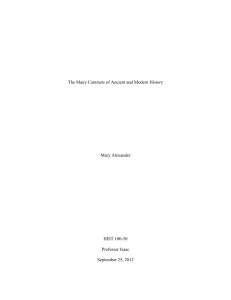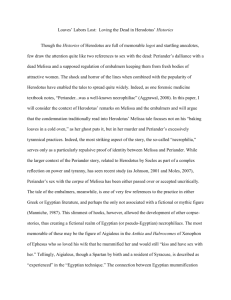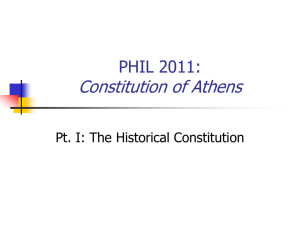Lecture 13: Blessed are the olbioi. Thomas E. Jenkins 1) Definition
advertisement
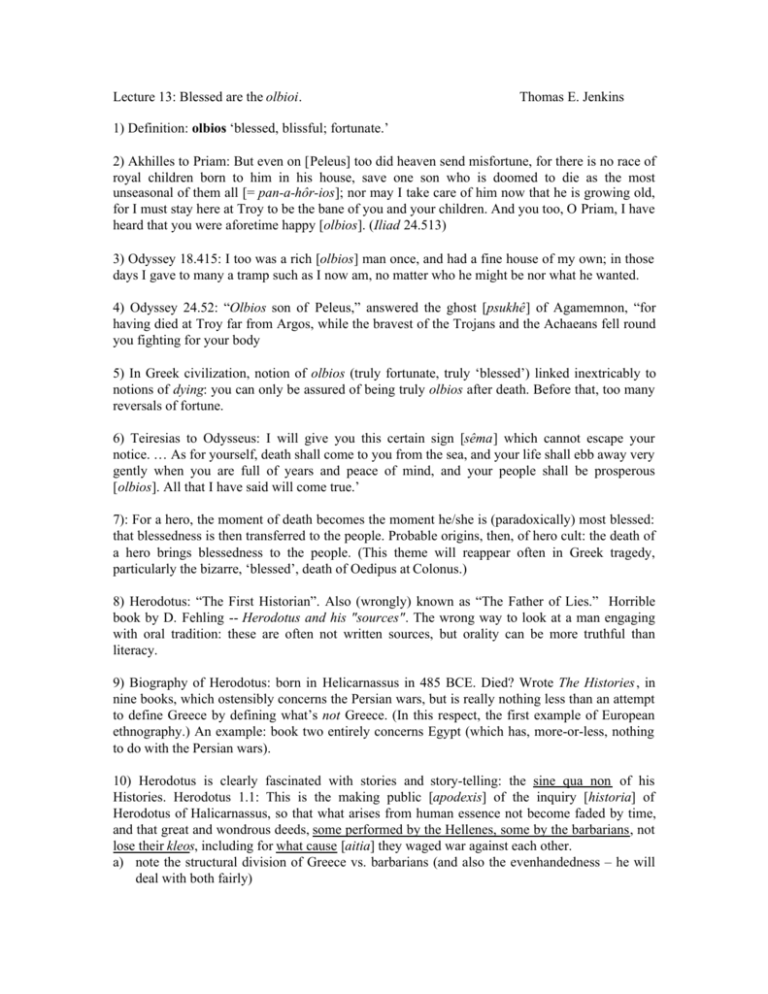
Lecture 13: Blessed are the olbioi. Thomas E. Jenkins 1) Definition: olbios ‘blessed, blissful; fortunate.’ 2) Akhilles to Priam: But even on [Peleus] too did heaven send misfortune, for there is no race of royal children born to him in his house, save one son who is doomed to die as the most unseasonal of them all [= pan-a-hôr-ios]; nor may I take care of him now that he is growing old, for I must stay here at Troy to be the bane of you and your children. And you too, O Priam, I have heard that you were aforetime happy [olbios]. (Iliad 24.513) 3) Odyssey 18.415: I too was a rich [olbios] man once, and had a fine house of my own; in those days I gave to many a tramp such as I now am, no matter who he might be nor what he wanted. 4) Odyssey 24.52: “Olbios son of Peleus,” answered the ghost [psukhê] of Agamemnon, “for having died at Troy far from Argos, while the bravest of the Trojans and the Achaeans fell round you fighting for your body 5) In Greek civilization, notion of olbios (truly fortunate, truly ‘blessed’) linked inextricably to notions of dying: you can only be assured of being truly olbios after death. Before that, too many reversals of fortune. 6) Teiresias to Odysseus: I will give you this certain sign [sêma] which cannot escape your notice. … As for yourself, death shall come to you from the sea, and your life shall ebb away very gently when you are full of years and peace of mind, and your people shall be prosperous [olbios]. All that I have said will come true.’ 7): For a hero, the moment of death becomes the moment he/she is (paradoxically) most blessed: that blessedness is then transferred to the people. Probable origins, then, of hero cult: the death of a hero brings blessedness to the people. (This theme will reappear often in Greek tragedy, particularly the bizarre, ‘blessed’, death of Oedipus at Colonus.) 8) Herodotus: “The First Historian”. Also (wrongly) known as “The Father of Lies.” Horrible book by D. Fehling -- Herodotus and his "sources". The wrong way to look at a man engaging with oral tradition: these are often not written sources, but orality can be more truthful than literacy. 9) Biography of Herodotus: born in Helicarnassus in 485 BCE. Died? Wrote The Histories , in nine books, which ostensibly concerns the Persian wars, but is really nothing less than an attempt to define Greece by defining what’s not Greece. (In this respect, the first example of European ethnography.) An example: book two entirely concerns Egypt (which has, more-or-less, nothing to do with the Persian wars). 10) Herodotus is clearly fascinated with stories and story-telling: the sine qua non of his Histories. Herodotus 1.1: This is the making public [apodexis] of the inquiry [historia] of Herodotus of Halicarnassus, so that what arises from human essence not become faded by time, and that great and wondrous deeds, some performed by the Hellenes, some by the barbarians, not lose their kleos, including for what cause [aitia] they waged war against each other. a) note the structural division of Greece vs. barbarians (and also the evenhandedness – he will deal with both fairly) b) Herodotus with deal with causes (aitiai): ‘how did it all begin?’ Herodotus’ narratives are fascinating: always note where he begins a tale. c) H. taps into the terminology of song-culture: he is recording the Persian wars so that the events and the participants have kleos. As Homer was to Troy, so too will Herodotus be to the Persian wars. 11) The fall of the house of Kandaules. Notice how H. leaps backwards in time: always looking for beginnings or causes (aitiai). 1.7. In the following way the kingship belonging to the Herakleidai passed over to the lineage [genos] of Croesus, called the Mermnadai. Kandaules, whom the Hellenes call Myrsilos, was the turannos of Sardis and the descendant of Alkaios son of Herakles. Agron son of Ninos son of Belos son of Alkaios was the first of the Herakleidai to be king of Sardis, Kandaules son of Myrsos the last. [And then continues backwards for 22 generations.] 12) The fable of wife of Kandaules/Gyges. 1.8: After a little while—for it was fated to go badly for Kandaules—he said to Gyges: “I do not think you believe me when I talk of the beauty of my wife, since people trust their ears less than their eyes. Find a way to see her naked.” … “The woman said: “Now, Gyges, I offer you the choice of taking one of two roads open to you. Either kill Kandaules and take possession of both me and the kingship of the Lydians, or you yourself must die on the spot, so that you may not in the future obey Kandaules in everything and see what you should not see. Either he who planned this must perish, or you, who saw me naked and acted unlawfully.” 13) The sting in the tale: 1.13. “The oracle answered yes and in this way Gyges became king. But the Pythia added that vengeance would come on behalf of the Herakleidai in the fifth generation after Gyges. The Lydians and their kings took no account of this epos until it came to telos.” 14) Fast-forward to Croesus, King of the Lydians (not a Greek, per se, but a conqueror of Greeks, and generally perceived as ‘friendly’: easy on the taxes). 15) The famous visit of Solon: After Solon had seen and thought over how great and fortunate [olbios] they were, Croesus found the opportunity to say, “Athenian xenos, we have heard much about your wisdom [sophia] and your wanderings, that you have gone all over the world philosophizing, so now I desire to ask you who is the most olbios man you have seen.” Croesus asked this question expecting the answer to be himself, but Solon, instead of flattering him, told it as it was and said, “O King, it is Tellos the Athenian.” Croesus marveled at what he had said and replied sharply, “In what way do you judge [krinô] Tellos to be the most olbios?” Solon said, “Tellos was from a prosperous polis and his children were good and noble [agathoi]. He saw them all have children of their own, and all of these survived. His life was well off by our standards, and his death was most distinguished: when the Athenians were fighting their neighbors in Eleusis, he came to help, routed the enemy, and died most beautifully. The Athenians buried him at public expense on the spot where he fell and gave him much timê.” 16) For Solon, Tellos has the best telos: a pun. He’s olbios because he’s already dead, and then his life can be measured. Measured in a) material/natural prosperity b) children/progeny and c) timê. 17) Croesus is annoyed. 1.31. “Croesus asked who he thought was next, fully expecting to win second prize. Solon answered, “Kleobis and Biton.” Story of K&B. The youths then lay down in the sacred precinct and went to sleep, and they never got up again; they remained in the pose that they had assumed in reaching their telos. The Argives made and dedicated at Delphi statues of them, since they were aristoi.” 18) Again, the collision of olbios and telos: K&B are olbios because they have a wonderful telos, ending. 19) Croesus is very annoyed. Asks again. Solon’s reply (in part) 1.32: I set the limit of a man’s life at 70 years; these 70 years have 25,200 days, leaving out the intercalary month. But if you make every other year longer by one month, so that the seasons [hôrai] agree opportunely, then there are 35 intercalary months during the 70 years, and from these months there are 1,050 days. Out of all these days in the 70 years, all 26,250 of them, not one brings anything at all like another. So, Croesus, a human life is entirely accident. To me you seem to be very rich and to be king of many people, but I cannot answer your question before I hear that your life came to a good telos. The very rich man is not more olbios than the man who has only his daily needs, unless he chances to have his life come to telos with all well.” 20: Again, a fixation on measuring: a life measured in days, but the reckoning can only be accomplished at the telos. 1.33 “By saying this, Solon did not at all please Croesus, who sent him away and took no further account of him. He thought Solon a great fool because he disregarded present good things and advised him to look to the reaching of telos in every affair.” 21: Herodotus’ narratives—even digressions—usually have a point. H. then launches into ‘history’ proper, with the expansion of Croesus throughout the Lydian states, and then with inquiries to the oracle about attacking Persia. 1.55. Third oracle: When a mule becomes king of the Medes, then, graceful-footed Lydian, flee along the Hermos of many pebbles, do not stay, do not feel any shame [aidôs] about being kakos. 22) Croesus makes some allies with the Hellenes, principally Sparta. After a series of reversals, his headquarters, Sardis, is under siege by the Persians. Note: the alliances between barbaroi ‘foreigners’ and Greeks are constantly shifting: here it is Sparta helping the Lydians against the Persians (!). Many city-states will defect to Persia (and back) during the course of the war. 23) The oracle comes true (1.85): He will first speak on a day that is not blessed [olbios]. 24: Exquisite ring composition: end of book one mirrors/mimics the beginning of Book One. Croesus is captured. (1.86) “As Croesus stood on the pyre, although he was in such great misery, it occurred to him that Solon had spoken with a god’s help when he said that no one among the living is olbios.” Through that kakodaimonia, Cr. gains tragic knowledge (this will happen in Greek tragedy as well). 25) The oracle was right, 1.91: When he consulted the oracle for the final time, he also did not understand the answer that Loxias gave him about the mule. Cyrus was this mule, for he was born of two people not from the same nation. Catalogue of Eastern Kings Lydians *Candaules *Gyges (685-657) Ardys (657-620) Sadyattes (620-610) Alyattes (610-560) *Croesus (560-546) Medes Deioces Phraortes (675-653) Cyaxares (625-585) Astyages (585-549) Persians (Achaemenid) *Cyrus (559-529) Cambyses (529-522) *Darius (521-486) *Xerxes (486-465) 26: Greece vs. Persia: the 4 great battles. a) b) c) d) Marathon, 490 BCE. (Athenians/Plataeans vs. Persians) Thermopylae, 480 BCE. (Spartans vs. Persians) Salamis, late 480 BCE. (Greeks vs. Persians) Plataea, 479. (Greeks vs. Persians) Things to think about when reading the battle descriptions: 1) what are the qualities of a leader? 2) what are the qualities of a ‘Greek’? Of a ‘barbarian’? 3) why does Herodotus ‘digress’ – is there any pattern to his one paragraph ‘asides’? 27) Then _______ in his turn melted, and wept as he clasped his dear and faithful wife to his bosom. As the sight of land is welcome to men who are swimming towards the shore, when Poseidon has wrecked their ship with the fury of his winds and waves—a few alone reach the land, and these, covered with brine, are thankful when they find themselves on firm ground and out of danger—even so was her husband welcome to her as she looked upon him, and she could not tear her two fair arms from about his neck. Indeed they would have gone on indulging their sorrow till rosy-fingered morn appeared, had not Athena determined otherwise, and held night back in the far west.

